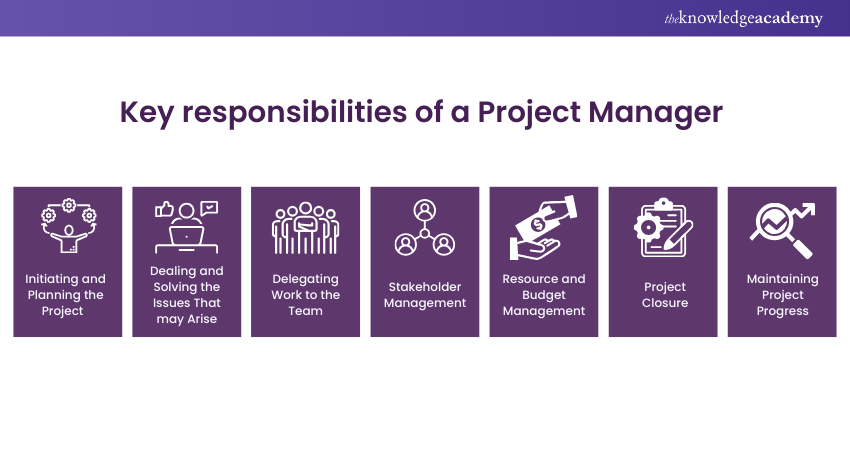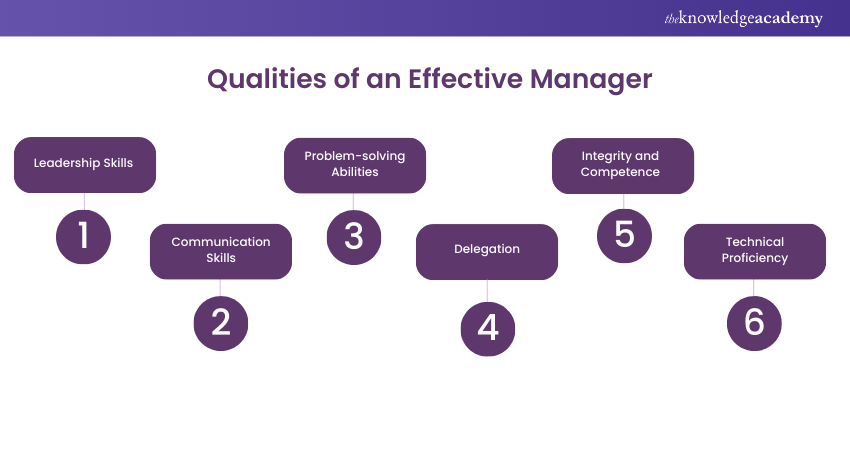We may not have the course you’re looking for. If you enquire or give us a call on 01344 203999 and speak to our training experts, we may still be able to help with your training requirements.
Training Outcomes Within Your Budget!
We ensure quality, budget-alignment, and timely delivery by our expert instructors.

Picture this: Your company has just landed a major client, and you’re tasked with delivering a high-profile project that could significantly impact your business’s future. How do you navigate this challenge successfully? This is where understanding the Project Manager Roles and Responsibilities becomes essential. A Project Manager is the driving force behind any successful project, orchestrating team efforts, optimising resources, and overcoming obstacles.
Glassdoor also reports that entry-level Project Managers earn an average annual salary of £45,335. Moreover, as Project Managers gain experience, their roles and responsibilities expand, leading to increased salaries. Given this context, this blog will delve into the Project Manager Roles and Responsibilities, and skills needed to excel in this pivotal role.
Table of Contents
1) What is the Role of a Project Manager?
2) Project Manager Responsibilities
3) What Makes a Good Project Manager?
4) What Qualifications do you Need to be a Project Manager?
5) Conclusion
What is the Role of a Project Manager?
As the lead role in a project, a Project Manager assumes multiple roles. Primarily, they manage the project and team effectively. They also act as a Stakeholder Manager, establishing relationships, managing expectations, and addressing conflicts. They align project objectives with the overall business strategy, ensuring readiness for change and maximising success. While these are their main roles, Project Managers have many other responsibilities.
Project Manager Responsibilities
A project usually involves many moving parts, and naturally, a Project Manager fulfils many different responsibilities. The responsibilities can be as mundane as taking regular updates from the team to meeting with stakeholders to align business and project goals.

1) Initiating and Planning the Project
2) Dealing With and Solving the Issues That may Arise
3) Delegating Work to the Team
4) Stakeholder Management
5) Resource and Budget Management
6) Project Closure
7) Monitoring Project Progress
Here is a detailed breakdown of all the responsibilities of the Project Manager.
1) Initiation and Planning of the Project
Project Initiation is crucial for defining goals, objectives, and scope. Managers collaborate with stakeholders to understand requirements and desired outcomes. They conduct comprehensive analyses to evaluate project viability and identify risks. Essential information and data are gathered to establish a robust foundation for planning and execution. Factors like resource availability, budget constraints, and technical feasibility are considered.
During planning, Project Managers outline how the project will be carried out, breaking it into manageable tasks, establishing dependencies, estimating resources, creating schedules, identifying risks, setting standards, and planning budgets. This careful definition sets the stage for successful execution and implementation.
Gain the expertise to effectively manage tasks, track progress and seamlessly collaborate – sign up for our Jira Training now!
2) Leading the Team
A significant responsibility of Project Managers is to provide effective leadership to the project team. They guide and inspire team members to perform at their best and achieve project objectives. This involves communicating goals and expectations, fostering a positive team culture, and recognising contributions. They define clear roles, assign responsibilities, and promote accountability. Open communication channels and regular meetings ensure transparent information flow.
Addressing conflicts promptly and promoting constructive dialogue is crucial. Providing support, guidance, and professional opportunities for growth enhances team capabilities. Making informed decisions and involving the team when necessary aligns choices with project objectives.
3) Execution
The Project Manager is responsible for and participates in both the carrying out and the monitoring of each of the project phases. This includes keeping continuous communication going with the team members and the beneficiaries of the project. This helps make sure the project is executed as planned.
Ready to move from planning to action? Learn What is Project Execution and how to successfully carry out your project phases with continuous communication and oversight. Dive in to get started!
4) Managing Time
Time is the scarcest resource in Project Management, forming the foundation of the entire project. Setting and negotiating deadlines for team members is essential. Effective time management involves strategic planning and scheduling, dividing tasks, and setting deadlines for each team member. Early identification of bottlenecks is crucial for timely project completion. Skillful resource forecasting helps anticipate and handle resource-related issues smoothly.
5) Monitoring the Project Progress
Project monitoring is a crucial responsibility for Project Managers, involving regular reviews to ensure the project meets its goals. They track milestones and deadlines to identify and address potential delays, compare actual progress with the planned schedule, and make necessary adjustments. Monitoring expenditure is essential to ensure efficient resource use and adherence to the budget. Project Managers also analyse risks and apply proactive mitigation strategies.
They ensure deliverables meet standards through inspections and corrective measures. Consistent communication with stakeholders about progress, challenges, and adjustments is maintained, ensuring transparency and effective collaboration. This comprehensive approach keeps the project on track and meets its objectives.
6) Solving Issues and Challenges That Arise
The biggest responsibility of a Project Manager is to solve any issues that might arise during the project actively. They play a pivotal role in maintaining project momentum and ensuring successful project outcomes. By adeptly addressing issues and challenges, Project Managers maintain project momentum, reduce risks, and ensure timely completion.
Their problem-solving skills, stakeholder engagement, and decision-making abilities are crucial in resolving issues and ensuring successful project outcomes.
Acquire the skills to proactively manage risks and ensure smooth project execution – register for our Project Risk Management Course today!
7) Managing Documentation and Reports
Project Managers are responsible for overseeing the management of documentation and reports throughout the project lifecycle. They establish document control procedures to organise and maintain project-related documents, ensuring easy access and accuracy.
They are responsible for generating accurate and tailored reports to give stakeholders an overview of project progress, milestones, risks, and issues. They ensure compliance with organisational standards and industry regulations. They also promote knowledge sharing by capturing lessons learned and fostering continuous improvement through project insights. Effective management of documentation and reports enables transparency, facilitates communication, and supports informed decision-making throughout the project.
8) Project Closure
Project Managers oversee the final stages to ensure a well-structured closure as a project nears completion. They verify the completion of all project deliverables, ensure documentation and records are finalised and properly archived, and communicate the project's closure to stakeholders.
Project Managers coordinate the release of resources, conduct project evaluations to assess performance, capture lessons learned, and celebrate the project team’s achievements. A thorough project closure provides valuable insights for future projects, facilitates knowledge transfer, and fosters a sense of accomplishment among team members.
What Makes a Good Project Manager?
A good Project Manager not only focuses on meeting project objectives but also fosters a positive and productive team environment. Let’s look at their attributes in detail:

a) Effective leaders inspire and motivate their team to achieve project goals.
b) Clear communication of project objectives, expectations, and feedback.
c) Efficiently addressing challenges and finding practical solutions.
d) Assigning tasks to the appropriate team members according to their strengths and expertise.
e) Fostering a positive team environment, encouraging collaboration, and recognising contributions.
f) Building trust and managing the project ethically and effectively.
g) Maintaining team morale and driving project success.
h) Competence in Project Management tools and methodologies, such as Agile
What Qualifications do you Need to be a Project Manager?
Project Managers require a blend of education, experience, and skills to excel in their roles. They must be adept at leading teams, managing resources, and ensuring projects meet their objectives. Let's look at their essential qualifications:
a) A bachelor’s degree in management, business, or a related field
b) Certifications like the Project Management Professional (PMP) or PRINCE2
c) Relevant experience in managing projects
d) Strong leadership abilities and excellent communication skills
e) Proficiency in Project Management software and methodologies like Agile
f) Constant professional development and staying updated with industry trends
Conclusion
In conclusion, understanding the diverse Project Manager Roles and Responsibilities is crucial for steering projects to success. By mastering strategic alignment, Project Managers can navigate challenges and drive their teams towards achieving goals. This comprehensive understanding enhances project outcomes and contributes to overall business growth.
Develop your skill set as a Project Manager and learn the essentials of Project Management with our Project Management for Non-Project Managers Course.
Frequently Asked Questions

Project Management Skills combine the necessary hard and soft skills for efficiently planning, executing, and concluding projects. Key skills include effective communication, leadership, problem-solving, and risk management, alongside proficiency in relevant software and methodologies.

Established Project Managers aiming to advance their careers often consider roles like Chief Operating Officer (COO) or other senior management positions, which vary by title across industries.

The Knowledge Academy takes global learning to new heights, offering over 30,000 online courses across 490+ locations in 220 countries. This expansive reach ensures accessibility and convenience for learners worldwide.
Alongside our diverse Online Course Catalogue, encompassing 19 major categories, we go the extra mile by providing a plethora of free educational Online Resources like News updates, Blogs, videos, webinars, and interview questions. Tailoring learning experiences further, professionals can maximise value with customisable Course Bundles of TKA.

The Knowledge Academy’s Knowledge Pass, a prepaid voucher, adds another layer of flexibility, allowing course bookings over a 12-month period. Join us on a journey where education knows no bounds.

The Knowledge Academy offers various PMP Training, including CAPM Certification Training, PMI-ACP, and PMP exam prep. These courses cater to different skill levels, providing comprehensive insights into Project Planning.
Our Project Management Blogs cover various topics related to Project Management, offering valuable resources, best practices, and industry insights. Whether you are a beginner or looking to advance your Project Management skills, The Knowledge Academy's diverse courses and informative blogs have you covered.
Upcoming Project Management Resources Batches & Dates
Date
 Introduction to Project Management Course
Introduction to Project Management Course
Fri 10th Jan 2025
Fri 14th Mar 2025
Fri 9th May 2025
Fri 15th Aug 2025
Fri 10th Oct 2025
Fri 12th Dec 2025







 Top Rated Course
Top Rated Course



 If you wish to make any changes to your course, please
If you wish to make any changes to your course, please


